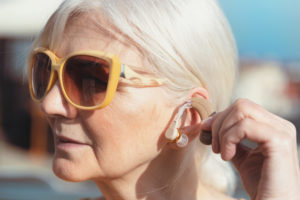
A paper published in the journal Scientific Reports by Concordia’s Natalie Phillips and her colleagues found that poor hearing was linked to a decline in memory and executive function in patients who are otherwise relatively healthy.
“We really want to look at individuals who have more restricted social networks and less social support,” says Phillips, professor of psychology in the Faculty of Arts and Science and the paper’s co-author. “Are the ones who are getting less brain stimulation and less social enrichment experiencing poorer cognition?”
Phillips says they really did not find strong evidence of that.
“All we can say at this point is that individuals who have poorer sensory abilities have poorer cognitive abilities, and we can’t explain it by more restricted social networks or social functioning.”
For the study, data collected from the CLSA between 2012 and 2015 was examined. None of the participants of the study suffered from any kind of cognitive impairment when the study began. Researchers controlled results for factors such as age, gender, education, and health status. After accounting for all factors, it was shown that there was still a strong relationship between sensory acuity and memory decline.
“We wanted to know why this relationship between our sensory and cognitive abilities exists,” Phillips explains.
Four Possible Hypotheses
The study lists four possible reasons why this strong relationship exists. First is because of a common cause of deterioration. It simply means that as participants got older, their cognition declined along with their hearing and vision.
A second hypothesis was made showing how sensory difficulty can lead to poor quality information entering the brain. Over time, this poor quality information could lead to a decline in cognitive functioning.
The third idea relies on resource expenditure. The theory is that if the brain is expending a lot of energy trying to understand what is being said, or what is being presented visually, there will be relatively fewer resources available to process the information effectively in the brain.
These three hypotheses have not yet been tested as they will need longitudinal follow-up baseline data to compare with baseline results. The fourth hypothesis was tested. This hypothesis looked at the establishment link between sensory decline and negative social outcomes such as the potential for increased depression, loneliness, and social withdrawal and isolation.
“It becomes hard to navigate your world,” explains Phillips. “Going out to social activities or maintaining conversations becomes complicated. So, we wanted to test whether this relationship between sensory function and cognition was mediated by limitations in someone’s social network.” In the end, the researchers did not find this to be the case.
This study is one of the first of its kind to look at the relationship between hearing loss, vision loss, and cognitive decline, and specifically why the relationship exists. Phillips and her colleagues note that this study is the first wave of data made available from a study that will span 20 years and that there is still a lot left to learn.